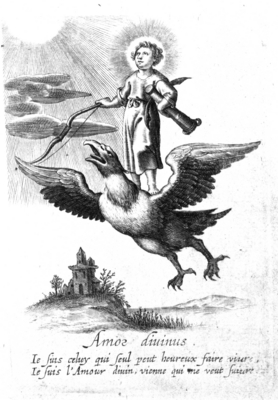Proprietates Amoris [43]

I.
Idiot.
AMoris natura est, semper amare, propriū post-
ponere, & commune præ ferre, diuersa corda
vnire, extraneum domesticum facere, corda ira-
cundiâ ignita extinguere, pacem semper procu-
rare.
Amor confracta solidat, depressa subleuat, nu-
tantem animum constantem reddit. Amor docet
& addiscit & inimicum nescit. Amor laudat; A-
mor reprehendit, Amor prauâ suspicione caret.
vbi Amor defuerit, nihil valet quidquid agitur:
contrà, omnia valent quæ cum Amore aguntur.
Amor hominem lætificat & à terrenis suble-
uat; Amor numquam est otiosus, sed semper ali-
quid operatur, semper crescit & augetur. Amor
vita est animæ, & qui non amat mortuus est. Ve-
rus Amor non requirit præmium, etsi mereatur.
Sine Amore nec elemosynæ largitio, nec martyrij
susceptio, nec aliquorum bonorum operatio pro-
ficere ad habendam salutem potest.
Amor hominem perficit, omnia sustinet, om-
nia patienter portat. Amor facilis res est, omni-
bus se exhibet, nulli se negat. capit eum bonus &
malus, iuuenis & senex, vir & mulier, sanus & in-
firmus, diues & pauper, summus & infimus, liber
& seruus, secularis & religiosus, debilis & fortis:
nec est qui se valeat excusare. quin in alios diri-
gat radios puri Amoris.
AMoris natura est, semper amare, propriū post-
ponere, & commune præ ferre, diuersa corda
vnire, extraneum domesticum facere, corda ira-
cundiâ ignita extinguere, pacem semper procu-
rare.
Amor confracta solidat, depressa subleuat, nu-
tantem animum constantem reddit. Amor docet
& addiscit & inimicum nescit. Amor laudat; A-
mor reprehendit, Amor prauâ suspicione caret.
vbi Amor defuerit, nihil valet quidquid agitur:
contrà, omnia valent quæ cum Amore aguntur.
Amor hominem lætificat & à terrenis suble-
uat; Amor numquam est otiosus, sed semper ali-
quid operatur, semper crescit & augetur. Amor
vita est animæ, & qui non amat mortuus est. Ve-
rus Amor non requirit præmium, etsi mereatur.
Sine Amore nec elemosynæ largitio, nec martyrij
susceptio, nec aliquorum bonorum operatio pro-
ficere ad habendam salutem potest.
Amor hominem perficit, omnia sustinet, om-
nia patienter portat. Amor facilis res est, omni-
bus se exhibet, nulli se negat. capit eum bonus &
malus, iuuenis & senex, vir & mulier, sanus & in-
firmus, diues & pauper, summus & infimus, liber
& seruus, secularis & religiosus, debilis & fortis:
nec est qui se valeat excusare. quin in alios diri-
gat radios puri Amoris.

Description de l'Amour.
I.
I.
August.
P. LaurēCapucin
L'Ame at en soy nō de soy, mais de Dieu
vn poids & inclination naturelle, vne pro-
pēsion raisonnable (que nous disons Amour)
per le moyen de laquelle elle peut (si elle
veut) tousiours se conuertir & viure en
Dieu, ayant vne naturelle tendüe & porteé
en luy, comme la pierre au centre de la ter-
re, voire & bien plus viuement, mais pource
que cet Amour naturel n'est pas beau de-
puis le premier peché, ny assez fort & suffi-
sant pour paruenir à ce bien surnaturel,
c'est pourquoy la charité increéat infus aux
Chrestiens par les Sacremens vne habitude
& disposition, vne forme diuine, qui est la
charité créee vertu Theologale, au moyen
de laquelle elle est puissante pour aymer
Dieu sur tout, & son prochain comme soy
mesme.
vn poids & inclination naturelle, vne pro-
pēsion raisonnable (que nous disons Amour)
per le moyen de laquelle elle peut (si elle
veut) tousiours se conuertir & viure en
Dieu, ayant vne naturelle tendüe & porteé
en luy, comme la pierre au centre de la ter-
re, voire & bien plus viuement, mais pource
que cet Amour naturel n'est pas beau de-
puis le premier peché, ny assez fort & suffi-
sant pour paruenir à ce bien surnaturel,
c'est pourquoy la charité increéat infus aux
Chrestiens par les Sacremens vne habitude
& disposition, vne forme diuine, qui est la
charité créee vertu Theologale, au moyen
de laquelle elle est puissante pour aymer
Dieu sur tout, & son prochain comme soy
mesme.
Translations
 |
Characteristics of love. |
 |
Love will die in foolishness. |
Literature
Sources and parallels
-
Porteman 1975, p. 212. Same pictura in:L'Amour divin [2] (in: Ludovicus van Leuven, Amoris divini et humani antipathia (1629))
[Compare
![Compare [compare]](/static/images/compare2.gif) ]
]
References, across this site, to this page:
- L'Amour divin [2] (in: Ludovicus van Leuven, Amoris divini et humani antipathia (1629))
![[H O M E : Emblem Project Utrecht]](/static/images/rd-small.gif)




































































































